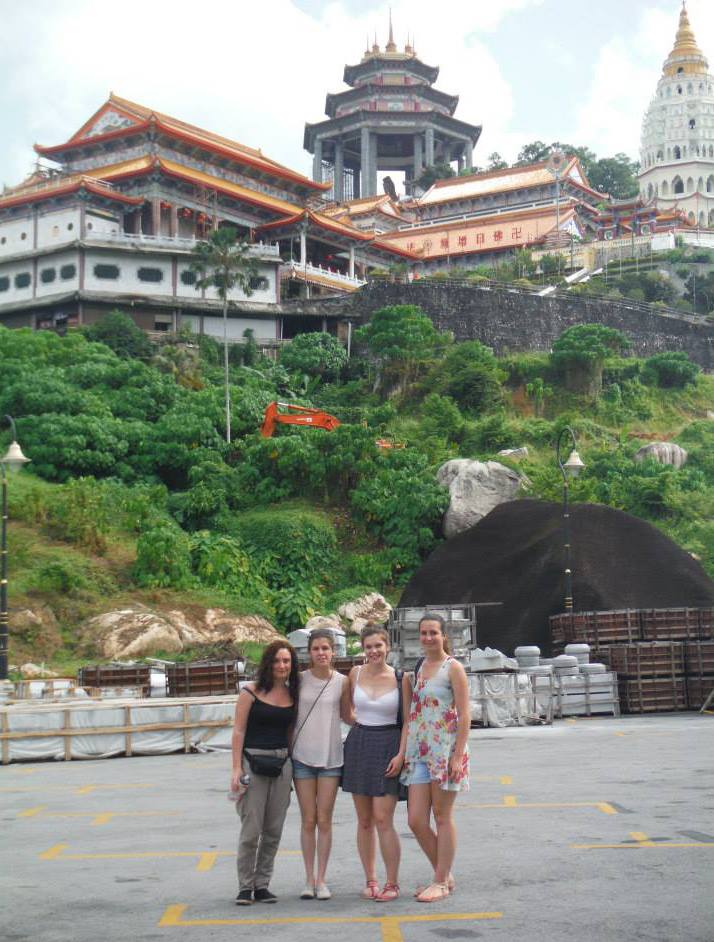In May 2013 four students from HSC’s BA Sociology & Social Policy programme undertook a 25-day placement in Malaysia, hosted by the Faculty of Social Sciences at Universiti Sains Malaysia located on the beautiful, historical island of Penang under the conscientious supervision of HSC’s Visiting Professor, Dr Azlinda Azman, Chair of Social Work, USM. The aim of the placement was to enable students to apply a sociological analysis to the constructions of welfare and care-giving in a very different socio-cultural context.
The four students, Heidi Crew, Samineh Hall, Dannielle Connolly and Roxanne Boydell successfully applied for BU Global Horizon funding. This valuable financial assistance enabled the students to help to spearhead the first set of planned steps towards the internationalisation of the Sociology+ programmes in delivering a FUSION focus.
Placements were divided into those for elderly citizens or children and young people with disabilities. The students were able to choose from a placement that related to their Level I study options, and go on to experience a number of different settings. The following extracts from their detailed narratives offer a glimpse into how the students negotiated unfamiliar constructions of need and care in an unfamiliar, post-colonial cultural setting.
Elderly care residential Homes (Sami, Roxanne and Danni):
The donations that the Home receives are very impressive. Even though families are unable to look after their elders due to the change in family structures and work, the elderly still hold a very important place within the community. People of Penang speak very fondly of the Home.
All in all, we learnt a lot from our weeks at placement and were very grateful to have been able to witness first-hand how the elderly were looked after in a different culture. From this experience we have drawn that there are many similarities in the way the Homes are run in Malaysia.
Unlike in the UK, the most popular Homes are charities and run on public donations. They receive many of these as Asia still regards their elderly population very highly. However, with the growing elderly population, we were able to witness the impact of the gap between young and old and the change in the family structures. All the Homes were struggling to find enough volunteers to help look after their residents as most of the young generation now (in particular young women who usually had the role of carer) have careers and may opt to put their relatives in a Home rather than adopt the old traditions of caring for the elderly at home.
Working with children with disabilities (Heidi):
World Play Day was another of my most memorable days. This was based at my second placement in Balik Pulau, where I would be based for the last 3 weeks I was in Malaysia. It is literally in the middle of nowhere: no shops near by and a 2-hour bus journey from Penang.
World Play Day was run by the older residents (18 and above) with varying disabilities, physical and mental. All the children from First Steps and any other children with disabilities within the area or outside, such as the mainland were invited to join in. ‘We are special’ was their motto, and every helper was given a T-Shirt saying this.
I was personally in charge of the ‘starch pool’. This was where the children could get used to texture, and some of them loved it. It was a swimming pool of rice flour and water, so that it made a thick gloopy mixture and was dyed pink with food colouring to appeal to the younger children.
Maddie, one of the other helpers, was in charge of the water slide. This was a tarpaulin sheet covered in water and washing up liquid, whilst there were other activities going on too. Everyone had a different station that they manned. I was just as covered in the starch at the end as the children were. The key to success on days like this was to get involved.
The day was and is sponsored annually by Starbuck Coffee. I never used to put money in their charity boxes that said ‘to help Asian communities’. Now that I’ve seen exactly what that money does and the amount of smiles that are produced from it I will never walk away from that charity box without putting something in.












 Dr. Ashraf cited on ‘Modest Fashion’ in The Guardian
Dr. Ashraf cited on ‘Modest Fashion’ in The Guardian NIHR-funded research launches website
NIHR-funded research launches website Academics write for newspaper in Nepal
Academics write for newspaper in Nepal New paper published on disability in women & girls
New paper published on disability in women & girls MSCA Postdoctoral Fellowships 2025 Call
MSCA Postdoctoral Fellowships 2025 Call ERC Advanced Grant 2025 Webinar
ERC Advanced Grant 2025 Webinar Horizon Europe Work Programme 2025 Published
Horizon Europe Work Programme 2025 Published Horizon Europe 2025 Work Programme pre-Published
Horizon Europe 2025 Work Programme pre-Published Update on UKRO services
Update on UKRO services European research project exploring use of ‘virtual twins’ to better manage metabolic associated fatty liver disease
European research project exploring use of ‘virtual twins’ to better manage metabolic associated fatty liver disease